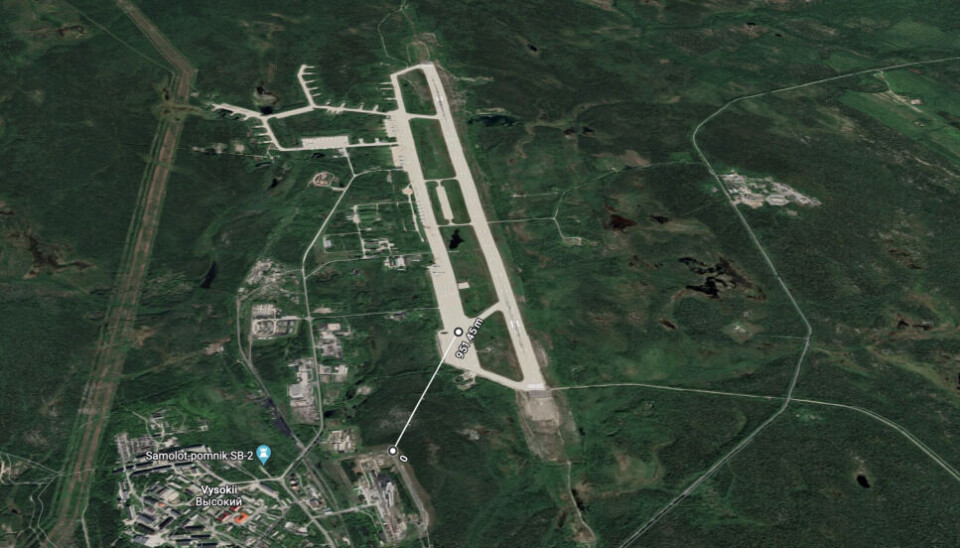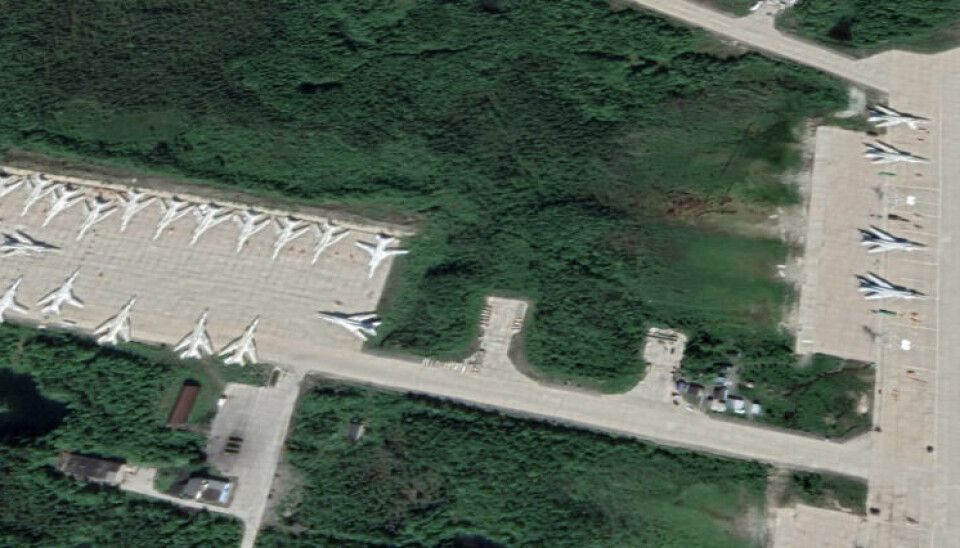
Ukrainian drone hit Tu-22M3 bomber at Olenya airfield, intel report claims
Russia's war against Ukraine has for the first time hit back on the Arctic. A Tu-22M3 bomber at the Olenya airfield on the Kola Peninsula was Saturday morning hit by a drone, the Intelligence Service of the Ukrainian Ministry of Defense reports.
The strategic air base at Olenya is 1,800 kilometers north of Russia’s border to Ukraine. This is the first reported attack inside the Arctic Circle after Russia launched its full-scale war on Ukraine in February 2022.
“As a result of the operation of the GUR of the Ministry of Defense near Olenegorsk at the military airfield Olenya at the base of the strategic aviation of the Russian occupiers, a long-range supersonic bomber-missile carrier TU-22M3 was hit,” the intelligence service said according to newspaper Ukrainska Pravda.
Shortly after, Ukrainian President Volodymyr Zelenskyy issued a statement:
“… each destroyed Russian airbase, each destroyed Russian military aircraft – whether on the ground or in the air – means saving Ukrainian lives. Guys, our warriors, I thank you for your precision!”
The drone attack is not confirmed by independent sources, and Russia’s military has so far not detailed more than saying “Russian troops destroyed 81 Ukrainian drones in the air within 24 hours,” information agency Interfax reports.
There are no information by now indicating from where the drone that hit Olenya was launched. If take-off from within Ukraine, the autopiloted flight has crossed 1,800 kilometers of central Russia. Another option could be that the drone was launched from somewhere inside Russia. Some of the largest wilderness areas in the European part of the country are on the Kola Peninsula, and south of the Murmansk region is Arkhangelsk and Karelia, two sparsely populated large regions mainly covered by forest.
Olenya airfield is located next to the town of Olenegorsk, where iron-ore mining takes place. A closed military town, Vysoky (also known under the military code-name Olenegorsk-8), is home to the air crew, the service personnel and their families. Further into the wilderness, north of Vysoky, is one of Russia’s main central storage for nuclear warheads located, the Bolshoye Ramozero (also known under the military code name Olenegorsk-2).
Bomber sorties
Olenya airfield is frequently used by Russia’s strategic aviation to attack civilian infrastructure in Ukraine with cruise missile. It was Tu-95MS bombers from Olenya that less than a month ago bombed the children’s hospital in Kyiv.
Russia’s strategic air forces last spring relocated more than 10 Tu-95MS and Tu-160 long-range bombers to Olenya. The move came after Engels Air Base in Saratov region was hit by Ukrainian drones.
From before, Olenya is home to a fleet of Tu-22M3 supersonic bombers.
Located above the Arctic Circle, Olenya is as far from the border to Ukraine as you can get in European Russia.
Not surprised
Associate professor Lars Peder Haga with the Norwegian Air Force Academy is not surprised by Saturday’s attack on Olenya.
“It was a question of when, not if, Ukraine was going to strike the base,” Haga says to the Barents Observer.
“Still an impressive feat, with Olenya 1,800 km from the Ukrainian border, with more or less continous GPS jamming in the region.”
The airfield is an hour drive south of Murmansk on the Kola Peninsula and about 200 kilometers from Russia’s border to Norway.
The border with Finnish Lapland is about 150 kilometers west of Olenya.

Several drones hit targets
In addition to Olenya, the two air fields of Engels in Saratov region and Dyagilovo in Ryazan region were hit by kamikaze drones from Ukraine early Saturday.
Like Olenya, Tu-95MS strategic bombers use Engels in attacks on Ukraine. The air field in Dyagilovo is mainly used for testing and training.
Tu-22M3 bombers are flying from a wider range of bases when attacking Ukraine.
Sunday Naval Parade
Saturday’s drone attacks against Russian air bases come a short 24 hours before Navy Day is to be celebrated. In Severomorsk, home to the Northern Fleet, warships and three nuclear-powered submarines are already lined up on the water outside the city centre.
Navy Day, with its warship parades, is a big military event in Russia.
This year, the two Northern Fleet nuclear-powered submarines Tambov and Kazan were supposed to be on display at Kronstadt outside St. Petersburg. But as previously reported by the Barents Observer, that part of the St. Petersburg event was eventually cancelled.
The submarines, along with two surface warships, instead sailed north to the bases on the Kola Peninsula.















